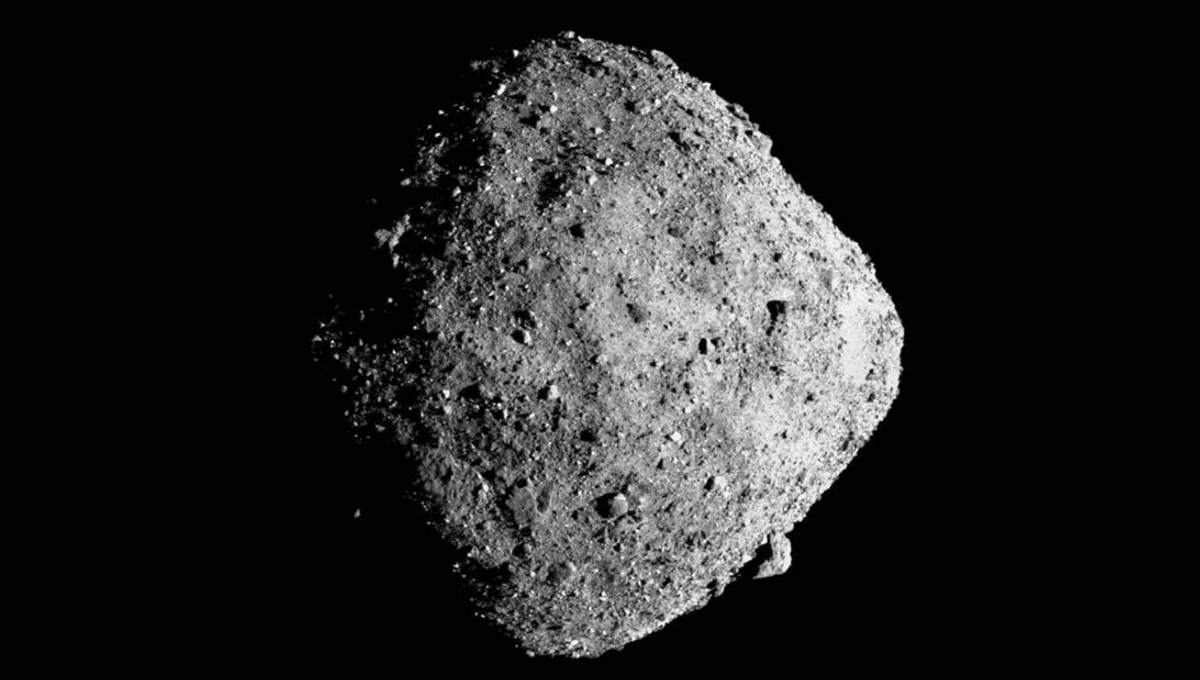
One of the few asteroids that humanity has visited might one day visit us. Unfortunately, while we delicately (with a little help from Queen’s Brian May) landed on the asteroid and scooped up samples to return home, a visit from Bennu to Earth would involve it slamming into the planet with the force of 22 atomic bombs.
But is it going to hit? And why does September 24, 2182 keep getting mentioned?
First of all, Bennu was largely chosen for a visit by NASA’s OSIRIS-REx due to the excellent radar data and telescope observations we already have on it, reducing risks to the mission. However, the asteroid is one of the most likely to hit Earth, and by studying its composition and orbit, NASA hoped to gain a greater understanding of the risk posed by the object.
Previous estimates had suggested the chance of hitting Bennu (hey, this goes both ways) sometime between 2175 and 2199 as one in 2,700. If it were to hit Earth, the 500 meters (1,640 feet) across asteroid would release 1,200 megatons of energy, 24 times the energy of the most powerful nuclear weapon built by humanity. While this is nothing to brush off, it is far smaller than the 9.7-kilometer (6-mile) asteroid that doomed the dinosaurs.
After two years of closely observing Bennu, NASA was able to better understand its future orbit, and refine the chances that it will one day collide with Earth.
“The OSIRIS-REx data give us so much more precise information, we can test the limits of our models and calculate the future trajectory of Bennu to a very high degree of certainty through 2135,” study lead author Davide Farnocchia, of the Center for Near-Earth Object Studies (CNEOS), said in a statement. “We’ve never modeled an asteroid’s trajectory to this precision before.”
Unfortunately, the odds have shifted slightly more in favor of an impact, to about 1 in 1,750 by the year 2300. The most likely date of impact, where the orbits are predicted to be closest, is September 24, 2182. On this date, there is a one in 2,700 chance of impact according to NASA, or around 0.037 percent. While it may seem counterintuitive that these odds are lower, think of how when you roll a die you have a one in six chance of getting a six, but if you have many more opportunities to get a six the odds against you getting it are reduced.
“Although the chances of it hitting Earth are very low, Bennu remains one of the two most hazardous known asteroids in our solar system, along with another asteroid called 1950 DA,” NASA explained.
NASA and other observatories track the orbits of objects discovered in the Solar System, keeping a particular eye on “near Earth objects” (NEOs) 140 meters (460 feet) and larger in size that could cause devastation if they were to cross paths with Earth. So far “no known asteroid larger than 140 meters in size has a significant chance to hit Earth for the next 100 years,” according to NASA.
One team was recently able to look further into the future using different methods.
“Assessing the impact risk over longer time scales is a challenge since orbital uncertainties grow. To overcome this limitation we analyze the evolution of the Minimum Orbit Intersection Distance (MOID), which bounds the closest possible encounters between the asteroid and the Earth,” the team explain in their paper. “The evolution of the MOID highlights NEOs that are in the vicinity of the Earth for longer periods of time, and we propose a method to estimate the probability of a deep Earth encounter during these periods.”
Using this method, the team were able to rule out the majority of NEOs from hitting our planet within the next thousand years, and could estimate the probability of some wiping us out further into the future. The probability of being hit before the year 3000 is looking pretty low according to the team, with the most likely object to hit us – 7482 (1994 PC1) – having only a 0.00151 percent chance of a close encounter, approaching the Earth closer than the orbit of the Moon.
While there is still the threat of unknown objects surprising us, if Bennu was on course the US and China have been working on proposals to deflect it away from Earth using rocket impacts, while last year NASA succeeding in redirecting an asteroid by slamming a probe into it.
Source Link: Is Bennu Really Going To Hit Earth On September 24, 2182?